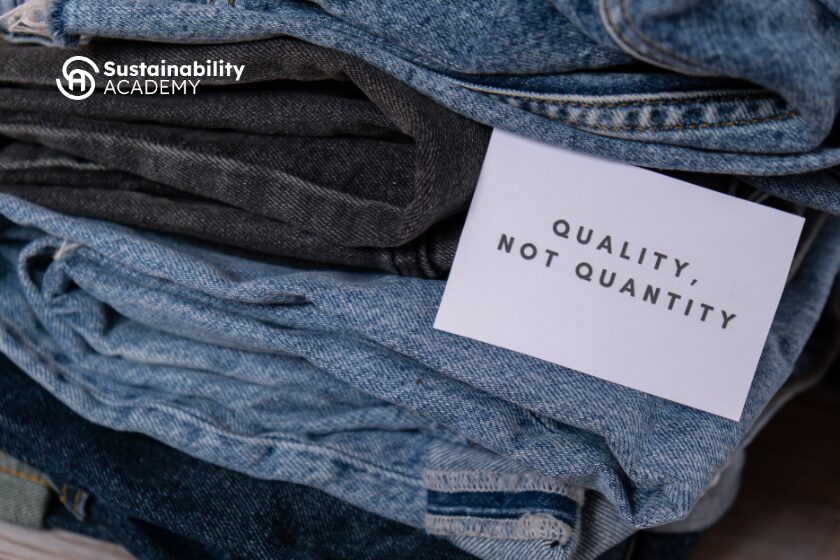The fast fashion industry is at a crossroads. Recent U.S. trade policies, particularly the imposition of tariffs on Chinese imports, are sending shockwaves through the sector. With increased costs and disrupted supply chains, brands like Shein and Temu—long reliant on duty-free shipments—are being forced to rethink their business models. At Sustainability Academy, we view this shift as an opportunity to drive meaningful change in the industry by promoting more ethical and sustainable fashion alternatives.
The Tariff Impact: A Turning Point for Fast Fashion?
The new 10% tariff on Chinese imports, along with the suspension of the “de minimis” rule (which previously allowed duty-free entry for packages under $800), is a game-changer. Fast fashion brands that rely on cheap, rapid shipments from overseas are now facing higher costs, which could lead to price hikes for consumers. This shift could inadvertently push the industry toward more sustainable and locally produced alternatives.
At Sustainability Academy, we emphasize that these policy changes present a unique moment for consumers to reconsider their fashion choices. With affordability and accessibility shifting, the case for sustainable fashion—rooted in quality, durability, and ethical sourcing—has never been stronger.
Sustainability Over Speed: Rethinking Consumption
Fast fashion has long been criticized for its environmental and social consequences. From excessive waste to exploitative labor practices, the industry’s reliance on mass production at minimal cost has fueled a cycle of overconsumption and disposability. As leading educators in sustainability, we advocate for a transition to a “slow fashion” mindset, prioritizing mindful consumption and responsible production.
Key sustainable fashion strategies include:
- Supporting Ethical Brands: Consumers can pivot toward companies that prioritize sustainable materials, ethical labor, and transparent supply chains.
- Investing in Quality Over Quantity: Higher-quality garments last longer, reducing the need for frequent replacements.
- Second-Hand and Circular Fashion: Thrift stores, clothing rental services, and upcycled fashion innovations contribute to waste reduction and resource efficiency.
- Local and Small-Scale Production: By supporting domestic brands, consumers can reduce carbon footprints and encourage local economies.
The Environmental Cost of Fast Fashion
The consequences of fast fashion extend far beyond economic shifts. The industry is one of the largest contributors to pollution and waste, with textile production consuming vast amounts of water and energy. Microplastics from synthetic fabrics contaminate water sources, while discarded garments pile up in landfills. The race for low-cost, high-speed production often comes at the expense of workers, with many employed in unsafe conditions and paid below a living wage.
A shift toward sustainability in fashion is not just an ethical consideration but a necessity for planetary health. By prioritizing sustainable materials such as organic cotton, hemp, and recycled textiles, brands can significantly reduce their environmental footprint. Likewise, consumers play a vital role by making informed purchasing decisions and supporting companies that prioritize environmental responsibility.’
The Economic Case for Sustainable Fashion
While fast fashion’s appeal lies in its affordability, sustainable fashion presents a compelling economic case in the long run. Investing in well-made, timeless clothing may seem costly initially, but it leads to greater savings over time as garments require less frequent replacement. Additionally, a shift to ethical labor practices fosters job security and fair wages for workers, promoting economic stability in producing regions.
From a business perspective, embracing sustainability can also boost brand reputation and customer loyalty. Modern consumers, particularly younger generations, are increasingly conscious of the environmental and social impact of their purchases. Brands that fail to adapt to these shifting preferences risk losing relevance in an evolving market.
Educating for a Greener Future
At Sustainability Academy, we believe education is the foundation for lasting change. Our courses empower individuals, businesses, and policymakers to adopt sustainable practices that go beyond short-term fixes. Whether it’s through practical expertise in ethical fashion supply chains or strategies for circular economy adoption, we equip professionals with the tools to lead the shift toward a more responsible industry.
By spreading awareness and offering practical solutions, we can foster a new generation of consumers and industry leaders who prioritize sustainability. Through our courses, participants gain valuable insights into sustainable supply chain management, eco-friendly textile innovations, and the importance of ethical labor standards.
The Future of Fashion: A Collective Responsibility
The current tariff policies may be causing turbulence for fast fashion, but they also serve as a wake-up call. This is an opportunity for consumers, brands, and policymakers to push for a more sustainable future—one where environmental and ethical considerations are embedded in the industry’s DNA.
Sustainability Academy remains committed to leading this change through education, advocacy, and practical expertise. If you’re looking to deepen your understanding of sustainable fashion and be part of the movement toward responsible consumption, explore our courses and join the conversation.
The fast fashion reckoning is here.

